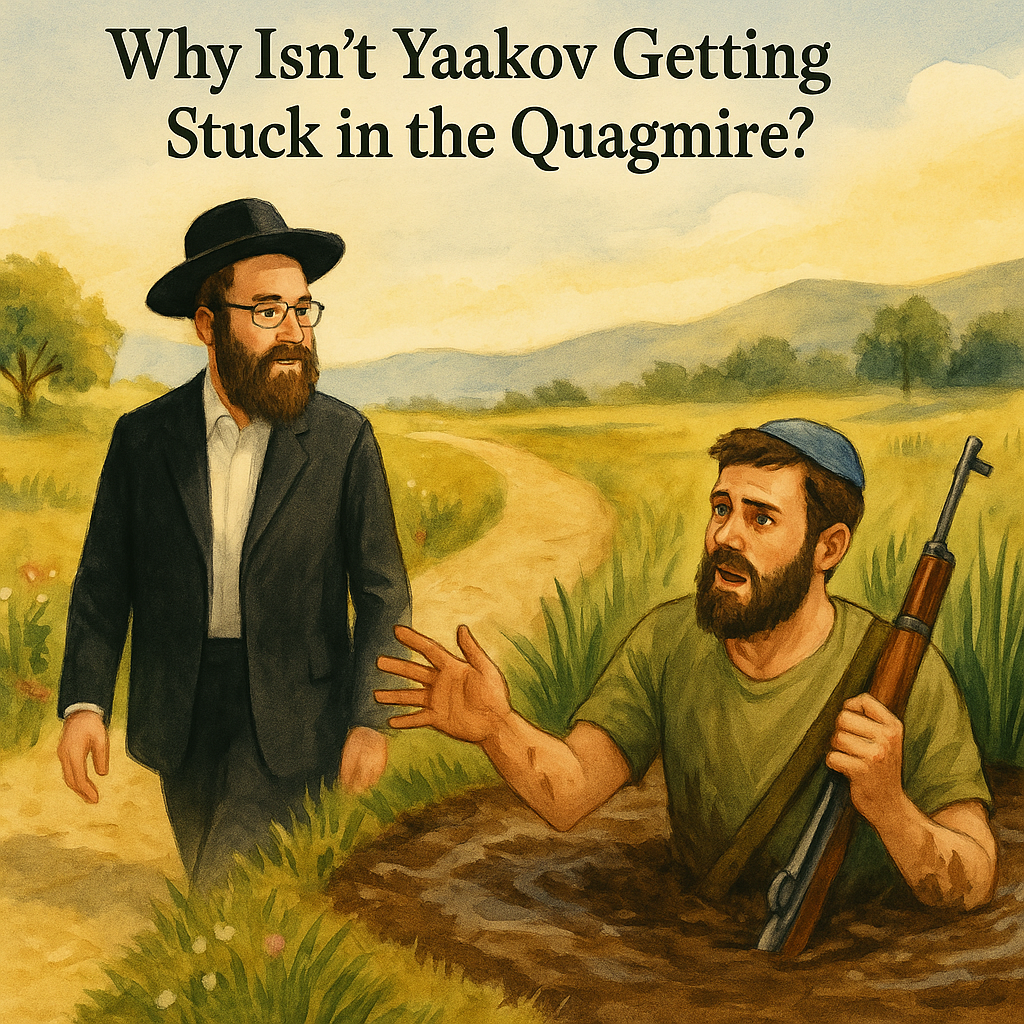How should Charedim respond to secular or national-religious Jews who feel resentment that we aren’t called up for Miluim (IDF reserve duty)?

First and foremost, let us begin with gratitude and empathy. We acknowledge that being called up for Miluim is no small thing. It means time away from family, financial pressure, psychological strain, and at times even danger. Anyone who goes through that for the sake of protecting fellow Jews deserves to be respected as a human being and a fellow brother. The Torah teaches us:
"וְאָהַבְתָּ לְרֵעֲךָ כָּמוֹךָ" — “Love your fellow as yourself” (Vayikra 19:18). This applies even—and perhaps especially—when we walk different paths.
Yet love does not mean agreeing on ideology. It means seeing each other as brothers even when we disagree. And in that spirit, we humbly respond to the question: Why aren’t we doing Miluim, too?
The Parable of Yaakov and Itzik
Let us explain through a parable—an old Torah tool for understanding life:
Once upon a time, two Jews, Yaakov and Itzik, stood before a great forest. Hashem had already given them a clear instruction at Har Sinai: “Walk this path. It is narrow, but it leads directly to Me.”
For thousands of years, Yaakov’s ancestors followed that path. Torah learning. Mitzvos. Yiras Shamayim. Through exile, persecution, and pressure, they walked the road of mesorah.
Itzik began on the same path. But a few generations back, he turned. He saw a road with bright lights and strong soldiers. "This one looks more modern. More practical. We’ll defend ourselves. We’ll build a country like all the nations."
And so he took that road. It was exciting at first, full of momentum. But then came the thorns—wars, hatred, assimilation, and fear. Now Itzik finds himself waist-deep in a quagmire. He needs reinforcements. He needs help. And so he turns to Yaakov, who is still walking on the narrow path, and cries, “Why aren’t you down here helping me?”
Yaakov’s response is not cold. He is not indifferent. He loves Itzik—he’s his brother! But with a gentle heart he answers, “Itzik… I didn’t leave the path. I’m walking the same way Hashem told us. I haven’t changed course. I’m not stuck in the swamp—not because I’m better, but because I stayed on the road we were commanded to follow. Why are you asking me to jump in? Why not come back to the path yourself?”
Understanding the Roots
The foundation of the Charedi life is this simple emunah: Torah is our protection. Not just spiritually—but physically, politically, and globally.
"אם לא בריתי יומם ולילה, חוקות שמים וארץ לא שמתי" “If not for My covenant [of Torah] day and night, I would not have established the laws of heaven and earth.” (Yirmiyahu 33:25)
This is not a metaphor—it’s a principle. Klal Yisrael exists only because of Torah. And it is the Limud HaTorah, especially full-time, uninterrupted Torah learning, that forms the backbone of our nation’s survival.
The Chazon Ish once said, “The yeshiva bochur immersed in Torah protects the Jewish people more than any battalion.” The Steipler Gaon cried when a bochur left yeshiva for the army, saying, “He left the shield for the sword.”
And we must ask honestly: Why is it only Charedim who are asked to abandon their mesorah and join another vision? If our path has preserved Jewish identity for thousands of years—should it not be respected? Shouldn’t it be admired, even if one disagrees?
Is There a Lack of Unity?
No. Klal Yisrael is one body with many parts. And Hashem, not man, assigns the roles.
“Some are appointed to protect with hands. Others with hearts. Others with mouths that speak Torah day and night.” (see Rambam, Hilchos Shemitah V’Yovel 13:12)
Imagine if the soldiers who guard the border got angry at the Kohanim in the Beis HaMikdash: “We’re risking our lives—why are you offering korbanos?” But the answer is: both are vital. One protects the body. The other, the soul.
So we say to our brothers: We see your struggle. But don't resent our choice to stay on the path of our fathers. It is not abandonment. It is loyalty. And through that loyalty, we believe we are helping to protect you, too.
Final Thought: We Are Still Brothers
We do not answer with anger or dismissal. We answer with love, with a tefillah in our hearts that one day all Jews will once again walk the same path—a Torah path, rooted in our holy mesorah.
Until then, we walk it faithfully. We ask not to be blamed for staying loyal. And we stretch out a hand to those ready to return—not with judgment, but with open arms.
Sources and Footnotes
- Vayikra 19:18 – “ואהבת לרעך כמוך”
- Yirmiyahu 33:25 – The world’s existence hinges on Torah learning.
- Rambam, Hilchos Shemitah V’Yovel 13:12 – Torah scholars are compared to the tribe of Levi, who serve Hashem directly and are not bound by worldly duties.
- Chazon Ish, Igros (Vol. I, Letter 19) – Torah is the true source of protection for Am Yisrael.
